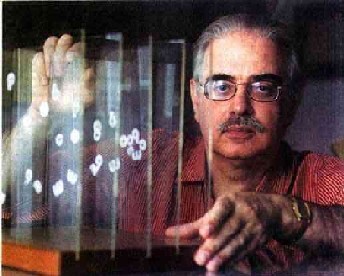 (Completed post.) I would remiss if I didn't include some other kinds of poetry, especially of the sort I admire and have learned a great deal from. One poet whose work I admired and took a pointer from is Augusto de Campos (1931-), one of Brazil's major 20th poets, and one of the international pioneers in the genre of concrete poetry (poesia concreta). With his brother Haroldo de Campos (1922-2003) and others, he launched the literary journal Noigandres, which marked the beginning of the Brazilian contribution to concrete poetry. He has since gone on to create works in a variety of media, including online forms, and has also translated numerous other writers, published a number of critical essays on his and others' works and aesthetics, and also written on music. In fact, his earliest concrete poems were inspired by the Second Viennese school composer Anton Webern.
(Completed post.) I would remiss if I didn't include some other kinds of poetry, especially of the sort I admire and have learned a great deal from. One poet whose work I admired and took a pointer from is Augusto de Campos (1931-), one of Brazil's major 20th poets, and one of the international pioneers in the genre of concrete poetry (poesia concreta). With his brother Haroldo de Campos (1922-2003) and others, he launched the literary journal Noigandres, which marked the beginning of the Brazilian contribution to concrete poetry. He has since gone on to create works in a variety of media, including online forms, and has also translated numerous other writers, published a number of critical essays on his and others' works and aesthetics, and also written on music. In fact, his earliest concrete poems were inspired by the Second Viennese school composer Anton Webern.One of the best online places to check out de Campos's work is on his UOL website, which is only in Portuguese (except for those works, like the early poem "lygia fingers," which is multilingual), but because of the poetry's graphic style and beauty, you can admire them even if you don't speak the language, and you can even hear him read some of them (but you'll need Windows Media).
Below's his 1975 poem "o pulsar," from UbuWeb's historical archive. The common Portuguese vowels "o" and "e" flicker out as dots and stars, leaving only the pulsing of consonants and other vowels, a metaphorical pulsar likened to a kiss that no sun heats up (abraço que nenhum sol aquece) and which the black hole hides (e oco oscuro esquece). You could also read it as pulsations recording a morse-like code with this same idea; in either case, "pulsar" can be both a noun (a pulsar, a pulsation) and a verb (to pulse, pulsate, throb)...










No comments:
Post a Comment